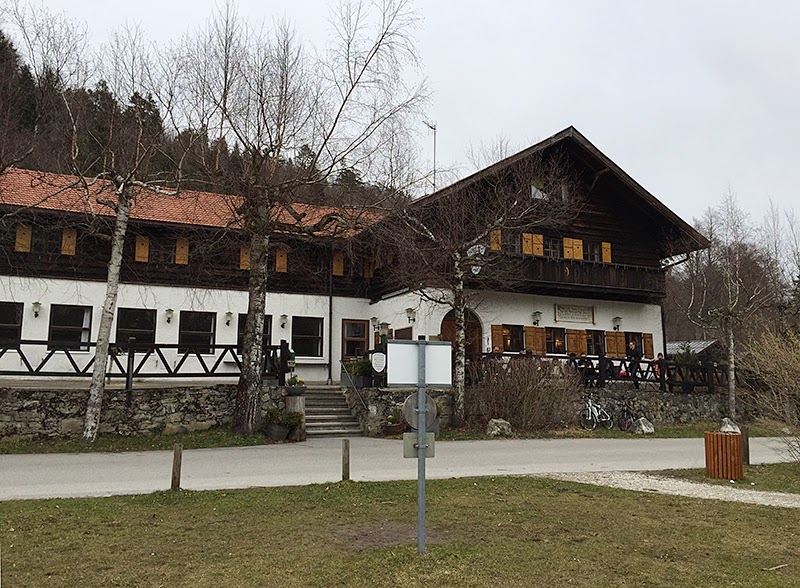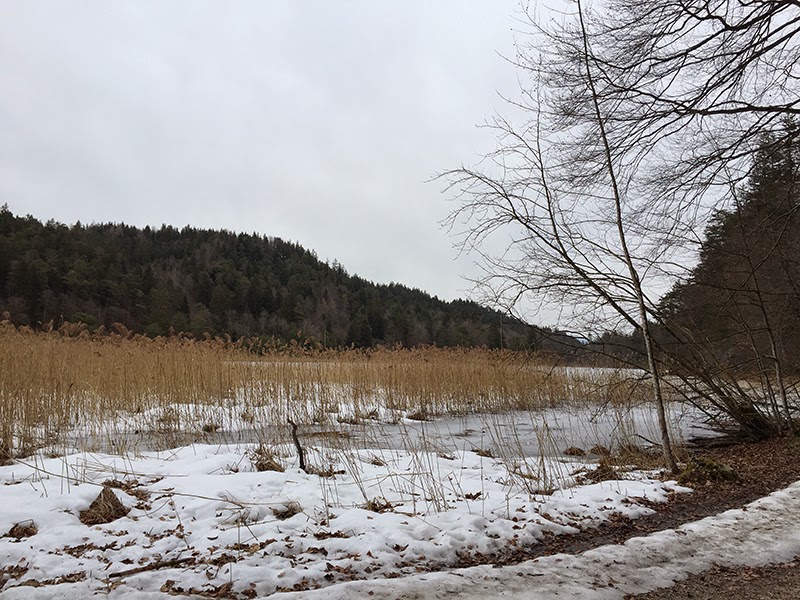 |
| The way ahead |
After a
day’s rest for the feet, further studious study of the weather forecast
revealed that Thursday and Friday were set to see precipitation of one sort or
another.
That meant
one thing: if we were to undertake another proper walk, it would have to be on
Wednesday.
Helpfully,
The Other Half – who had spent weeks studying online maps for precisely such
ends – had just such a walk planned. So off we went, having this time
remembered to take bottles of water with us but, unfortunately, no Kendal Mint
Cake. I should have taken a slab to Bavaria on principle.
Our
destination was another small Alpine lake, the Alatsee, and the start of the
walk took us through the park at the back of summer palace of the bishops of
Augsburg before we crossed a small, wooden bridge and climbed gently upwards
onto a wooded ridge.
Germans,
as I’ve mentioned before, care passionately about forests – it’s an essential
part of the national psyche. Woods are so central a part of German life that,
when it was discovered, in the 1980s, that the woods were dying from pollution,
there was a united commitment to doing something.
 |
| Woodland delicacy |
That the
country is now a major producer of renewable energy is, in part, a result of
that – and also an indicator that green politics is not seen as overtly as
‘left’ in the way it is elsewhere, not least in the UK.
For British
townies in particular, we have, in general, long lost that sense of connection
with nature.
But in
Germany, no town or city is far removed from a wood or forest in which to spend
time.
And these
are maintained and looked after with great dedication, as are the footpaths
that wend through them.
My mental musical
theme for the week – with the exception of a burst of Wagner when at
Neuschwanstein – was The Happy Wanderer.
Mein Vater war ein Wandersmann, to give it its original German title, was
originally penned by Florenz Friedrich Sigismund (1788-1857), while the tune
we’re familiar with was composed after WWII by Friederich-Wilhelm Möller.
 |
| Wood – smelling beautiful |
A 1953 performance of the
piece by the Obernkirchen children’s choir at the Llangollen International
Musical Eisteddfod, broadcast on BBC radio, saw the song become an instant hit
and staying in the singles chart (a top 12 at the time) for 26 non-consecutive
weeks.
As we wandered through
woodland, for a long while, with the sounds of the traffic of Füssen
intermittently drifting upward to us, yet already in a different world, it
drifted into my head again and even, quietly, from my lips: a song from
childhood memory, suddenly taking on a new life.
 |
| Away from it all |
We stopped to inspect
tiny flowers alongside the path; to listen to the birds around us; to watch as
a small deer sprung away through the trees, glancing back over its shoulder to
check us out.
 |
| It wasn't a busy road |
The process of
maintaining the woods means that some trees are felled. Clearly there had been
recent work done in this department, as we saw logs stacked neatly between
pairs of standing trees.
Walking past one such
stack – clearly very recently cut – the smell was astonishing. Forget those
ghastly ‘air fresheners’ in cars and elsewhere: this is what trees smell of and
it’s intoxicating.
 |
| Perfect for lunch |
As we made
our way, the road sounds drifted away entirely: the tranquillity was wonderful
and eventually the tinkling of a beck made it’s way up to our ears.
Having
discovered (the hard way) the result of the lack of contour lines on Google
maps, we made a decision after some time to take a path down the side of the
ridge to meet a road that then went on to the lake, rather than take what
looked to be a harder path that would take us back up before coming down near
the lake.
I say
‘road’, but I don’t recall a single vehicle passing us as we strolled along it,
the metal points of our walking sticks now striking the tarmac surface.
 |
| Brilliant beer .... |
The trees
to our left eventually fell away, leaving us with views of Alpine pasture
filling the space between the ridge we come along and the rather higher hill
side opposite.
We made it
to the lake for around 1pm – perfect, since the hotel there also has a
restaurant and The Other Half had fully factored this into his plans.
With the
temperature ludicrously mild, we sat outside the chalet-style building and
ordered drinks while scanning the menu.
The beer
was a caramel-coloured dunkel from
the Aktienbrauerei – the oldest existing brewery in Kaufbeuren, first mentioned
in 1308, a whopping 208 years before the Reinsheitsgebot
– and was the best beer of the week, with an absolutely wonderful taste.
As we
sipped, we could hear the sound of The Other Half’s schnitzel being beaten out
in the nearby kitchen. Oh, this was going to be freshly cooked.
 |
| ... and fabulous fodder |
For myself,
I had leapt at the opportunity to try spätzle
for the first time. A sort of soft egg noodle from the south of Germany (and
areas to the east), I knew it by legend alone.
It came as
the bed on my (large) plate, dressed in melted butter and with a vast mound of
gloriously crisp and wafer-thin fried onion rings atop a piece of absolutely
superb beef that had been cooked to perfection: beautifully seared on the
outside and melting to very pink the further in I got.
It was the
perfect illustration of how good food doesn’t have to be haute cuisine. This was perfection.
Sated, we
sat awhile, quietly taking in the view.
The Alatsee
spread put in front of us, with a snow-capped
 |
| The Alatsee |
It was
still largely iced over, although where the thaw had set in, the water was that
rich malachite green again, and crystal clear at the edge, creating a perfect mirror
to reflect its surroundings.
It’s
apparently a meromictic lake – meaning that it has layers of water that do not
mix, which in turn means that it can include within it radically different
environments for organisms.
 |
| Snow ahead |
Such
bodies of water were only really named in the early 20th century. They may
occur where the basin sides are unusually deep and steep compared to the lake’s
surface, and where the lower layer of the water is highly saline and denser
than the upper layers.
The
Alatsee is 868m above sea level, with a surface area of 12 hectares and a
maximum depth of 32.1m. There are such toxic organisms living in the lake that they’ve
been blamed for a number of divers have died or disappeared in its waters.
And as if
this were not enough, it’s one of the (many) spots that’s alleged to be hiding
‘Hitler’s gold’ – although Lake Toplitz in Austria beats it for plausibility,
given that forged British banknotes were found by divers in chests, together
with a printing press, in 1959.
You see –
travel broadens the mind: or at least the knowledge base.
 |
| The Obersee |
Eventually,
we set off again. This time, the intention was to walk back along the valley
floor on the opposite side, along the Faulenbach and passing the smaller Obersee
and the positively diminutive Mittersee before reaching Füssen.
This route
had been less exposed to the sun, meaning that snow several inches deep still lay
in patches over the path. Those walking sticks were proving very handy.
There was
evidence of winter tree fall from the steep, rocky ridge now to our right, and
also where the local forestry management teams had come in and removed the
section of a tree that had fallen across the path, leaving the rest where it
lay.
 |
| Looking back from the Obsersee |
Again, the
sounds of trickling water and bird song were the dominant ones, leaving city
natives to feel almost out of kilter at the absence of urban drone. It’s a long
time since I spent so long away from the sounds of traffic.
The
Obersee was almost completely iced over, with reeds rearing up to tell you that
there was marshy land beneath the frozen white.
And so we continued
toward the town; another satisfying walk under our belts – another day gazing
at this extraordinary landscape and feeling awed by it. Happy wanderers indeed.
No comments:
Post a Comment